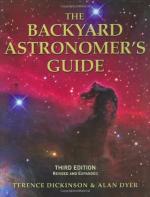|
This section contains 515 words (approx. 2 pages at 300 words per page) |

|
 Increased computerization in telescope operations means that fewer astronomers stay up late into the night, peering through lenses.
Increased computerization in telescope operations means that fewer astronomers stay up late into the night, peering through lenses.
An astronomer is a person who studies everything above Earth's atmosphere. The field of astronomy is so broad that no one person can hope to be fluent in all aspects. Most astronomers specialize in one of several branches of astronomy. Astrophysicists study the origin and evolution of stars. Planetary geologists study the formation of planets. Cosmologists study the origin, evolution, and ultimate fate of the universe.
Astronomers rarely have the opportunity to study astronomical objects directly. They must depend on various forms of electromagnetic radiation received from distant objects. However, much information can be extracted from the radiation through careful analysis: chemical composition, temperature, motion through space, rotation speed, magnetic field strength, and other physical features.
In order to measure how bright an object in space is or measure its...
|
This section contains 515 words (approx. 2 pages at 300 words per page) |

|


